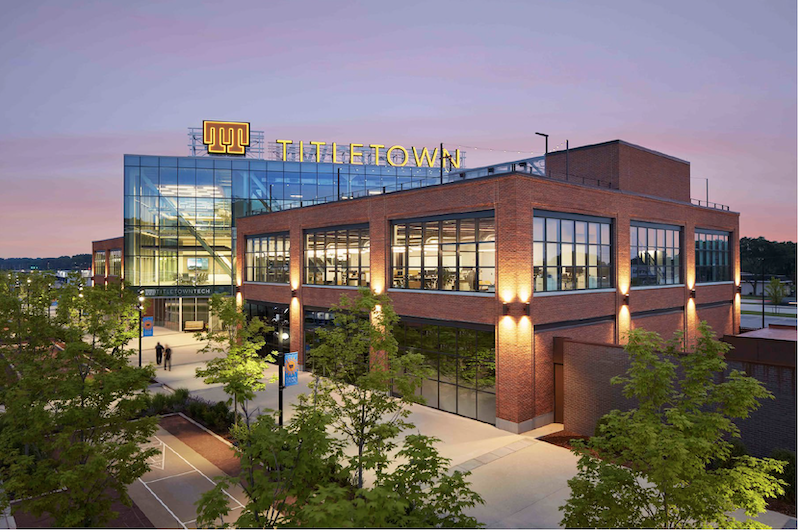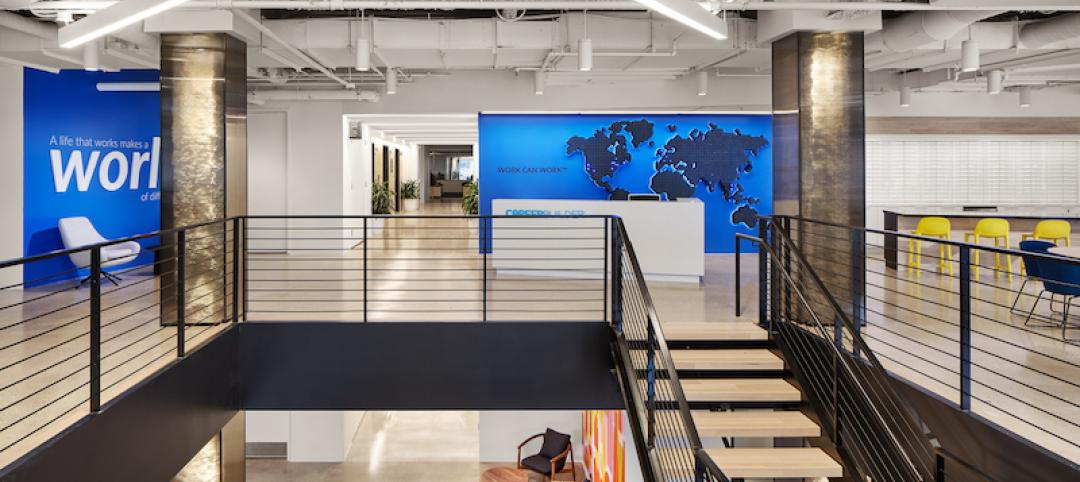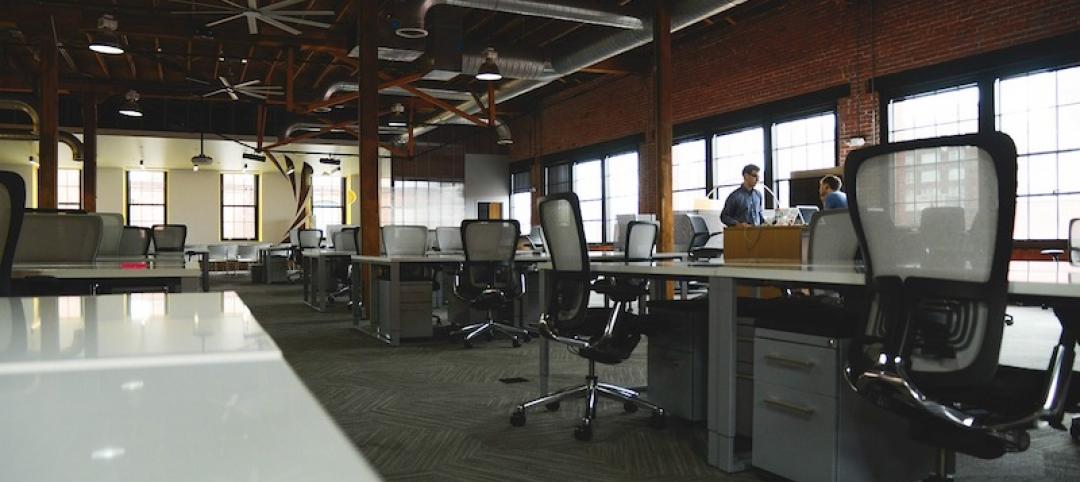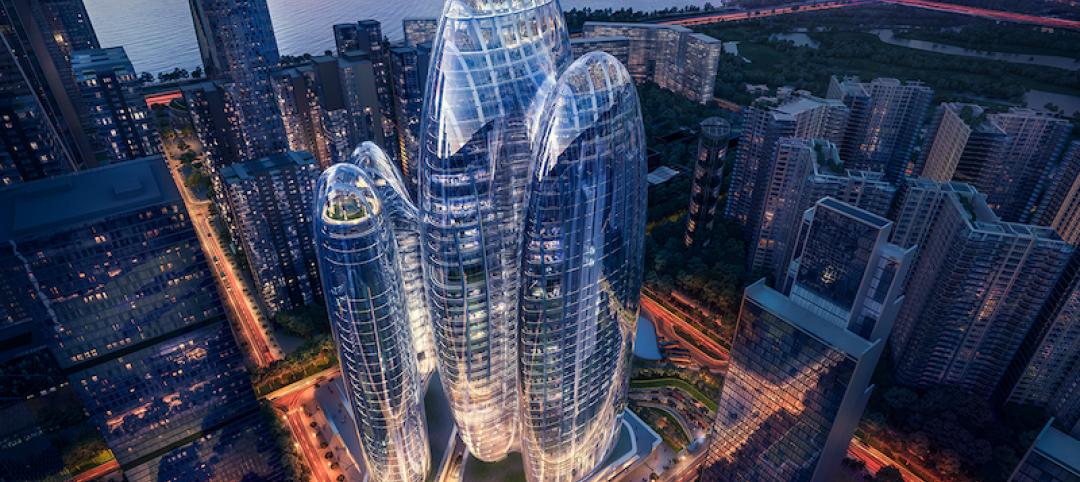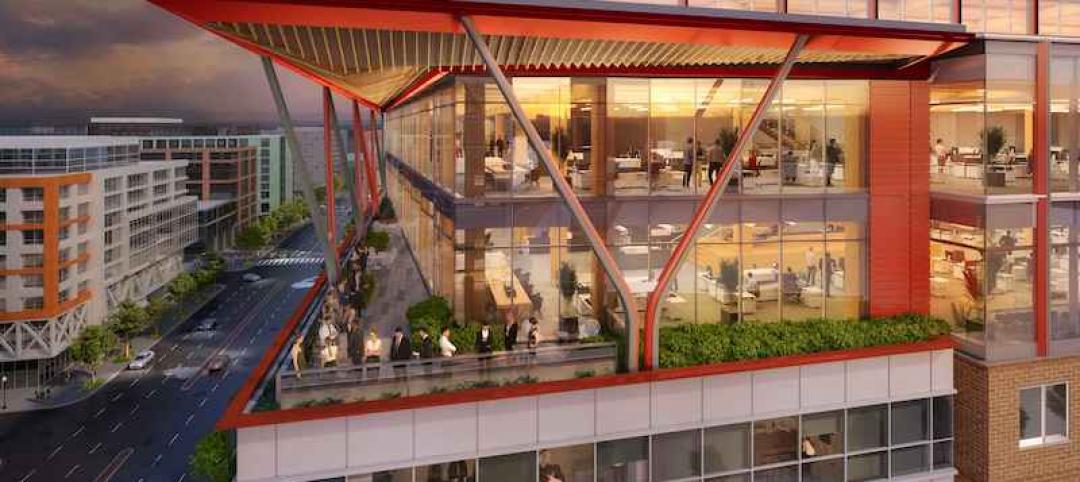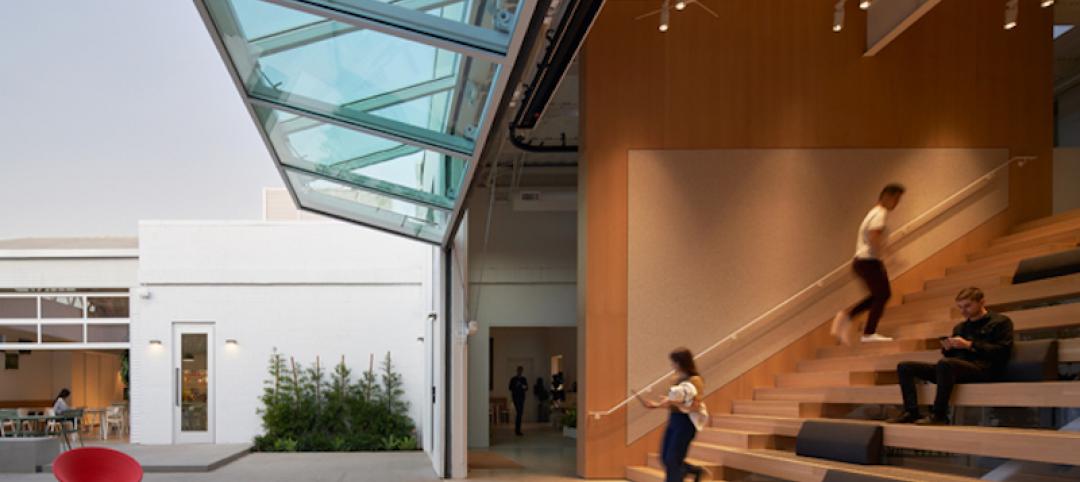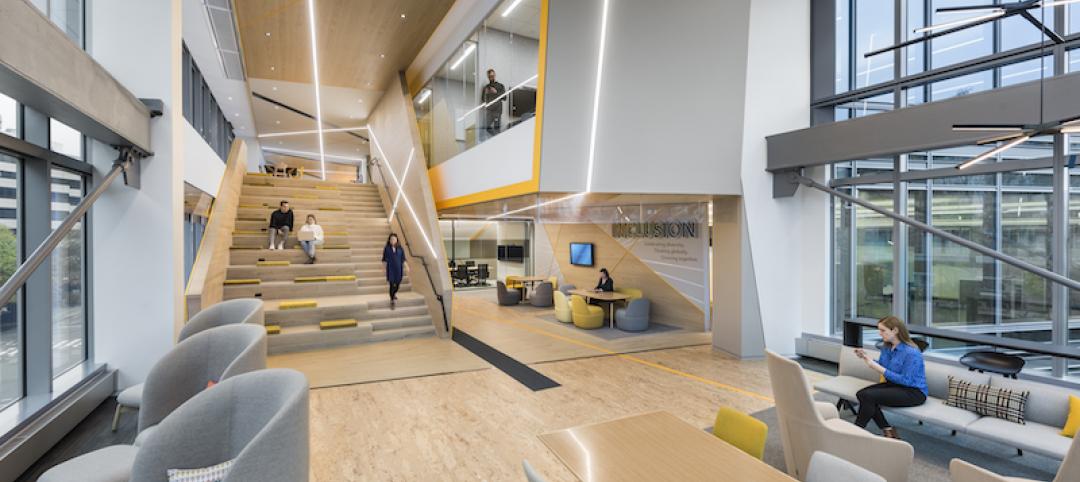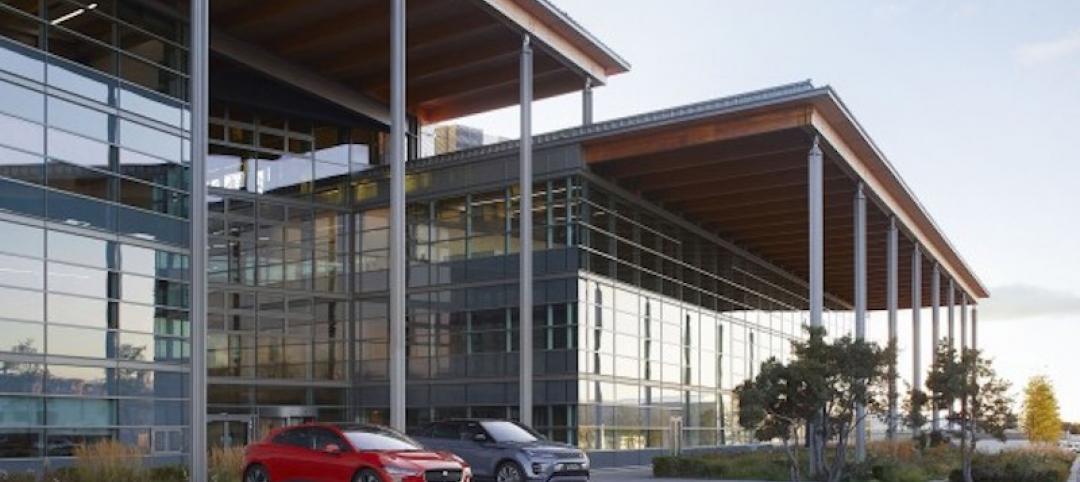Football is often described as game of strategy. So perhaps it wasn’t surprising that the Green Bay Packers, through a joint venture between the team’s development arm and Microsoft, recently opened TitletownTech, a 50,000-sf innovation center in Green Bay, Wis., that is set up to cultivate and provide financial support to high-growth startup companies.
SGA, the architect on this project, has created a three-level “stage on which innovation and collaboration can flourish,” states Brooks Slocum, the firm’s New York Studio Manager. He elaborates that the building’s design applies “spatial strategies” that “maximize” proximity, flexibility and spontaneity.
The design reflects Wisconsin’s old mill buildings, showcasing brick, steel, and wood. Those features are juxtaposed with high-tech glass and state-of-the-art materials.
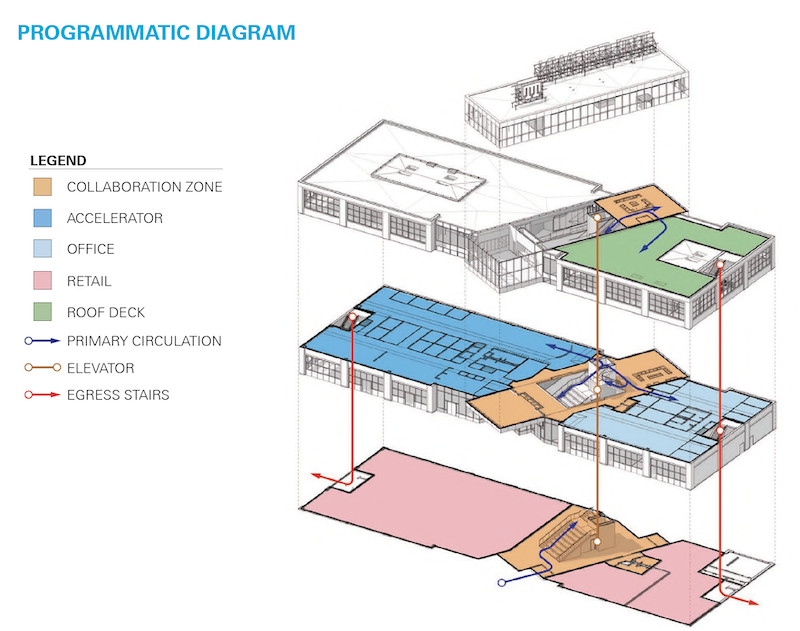
TitletownTech is designed and organized into three levels that promote user collaboration and interaction. The second floor is devoted mainly to office space.
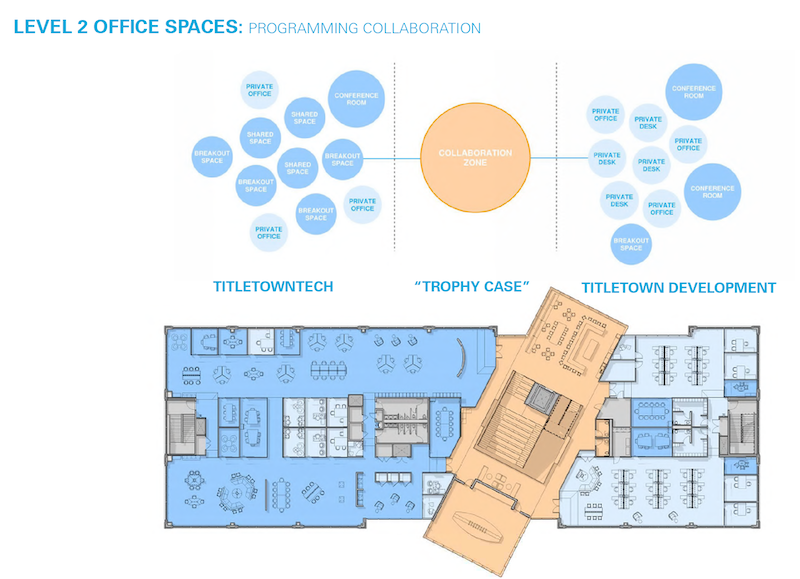
Three components drive TitletownTech, which actually has been operational since last summer but had its grand opening on October 18:
•An innovation lab, focused on creating new ventures: where entrepreneurs and established regional businesses can engage to develop ideas, explore disruptive new business models and next-generation technology solutions. The first floor includes flexible seating reminiscent of stadium bleachers. Informal lounges and social spaces are interspersed throughout the building. “Hot spots” allow guests to congregate for impromptu meetings. And “sandbox” spaces are equipped with oversized writable magnetic walls to help users flesh out ideas and discussions.
•A venture studio, focused on building ventures: where new and emerging business models and scalable industry solutions are developed into stand-alone startup ventures. Microsoft will have employees based at TitletownTech, including a Technologist in Residence, who can be resources for entrepreneurs. Microsoft’s TechSpark initiative—a civic program created to focus on communities in six states that include Wisconsin—will also have a representative on site. (Microsoft’s agenda at TitletownTech includes its goal to eliminate the rural broadband gap for millions of Americans.)
•A venture fund, focused on funding and investing in high-growth startups aligned with industries in Northeastern Wisconsin that will bring opportunity to the region. As of last October, the venture fund had $25 million, and its limited partners include AmeriLux International, Baird, Cornerstone Foundation of Northeastern Wisconsin, Dickman Ventures, Green Bay Packaging, N.E.W. Venture Foundry, Plexus, Schreiber, Schneider, Sartori Cheese, The Village Companies and Weyers Investments, Delaware North, New York Mets and Sterling Project Development.
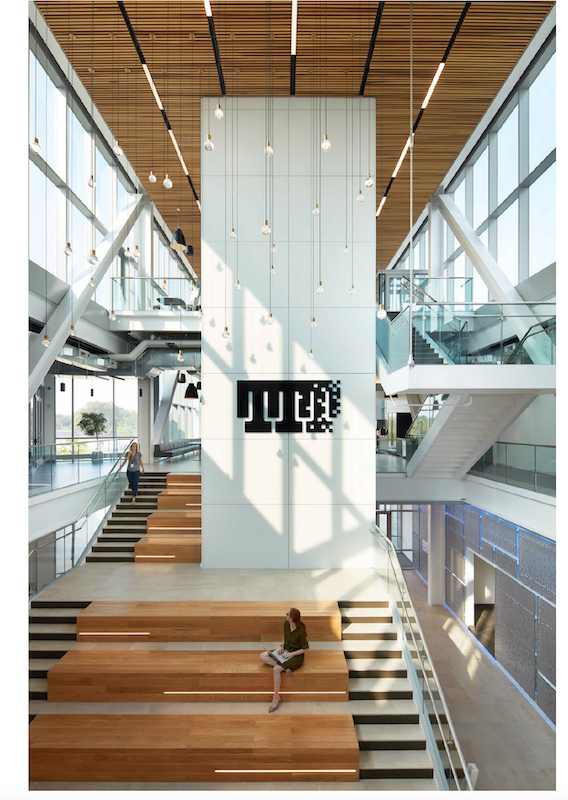
The first floor of an expansive atrium features flexible seating that suggest stadium bleachers, and encourages people to interact as that move from level to level.
TitletownTech is integrated into the Packers’ 45-acre Titletown District, located west of the team’s Lambeau Field stadium. The District’s 20-acre first phase, completed in 2017, includes a hotel, retail, restaurants, and sports medicine center. Phase 2, whose construction began last June, focuses on residential and commercial buildings, including at least 54 townhouses under constuction, as well as a five-story office building, and 152-unit apartment building. So far, the Packers have invested $170 million in its Titletown District.
“Northeastern Wisconsin has a burgeoning entrepreneurial ecosystem, and we felt Titletown would be a perfect place to further spur economic expansion in the region and beyond by bringing world-class digital innovations and expertise to Greater Green Bay,” explains Aaron Popkey, a spokesman for the Green Bay Packers. He goes on to say that TitletownTech will serve as a creative center where digital solutions are developed for key market challenges.
TitletownTech is already working with a handful of companies that include Oculogica, a digital healthcare firm that has developed the EyeBOX, the first FDA-approved neuro-diagnostic device that uses proprietary and innovative technology to track eye novement to determine if a person has a concussion (a tool that might benefit the football team directly).
Through BIM coordination, SGA and Miron Construction, TitletownTech’s CM, reduced the innovation center’s construction costs by between 1.5% and 3%. Utilizing Enscape software’s real-time rendering capabilities, SGA’s models represented the actual materials, design intent, specifications, detailing, and coordination. The models helped to identify, for example, that structural beam openings were too small, and that a large fan in the building’s atrium needed a framing system and mounting points.
Preconstruction visualization for the innovation center, offices, and boardroom also provided scheduling savings. And the team was able to spot MEP/FP clashes and re-route systems in a 3D clash-protection process.
Editor's note: Some information about Titletown Tech, and comments from Green Bay Packer spokesman Aaron Popkey, were added after the initial posting of this article.
Related Stories
Office Buildings | Feb 13, 2020
CareerBuilder’s Chicago HQ undergoes renovation
Perkins and Will designed the project.
Office Buildings | Feb 11, 2020
Want your organization to be more creative? Embrace these 4 workplace strategies
Creativity is the secret sauce in the success of every business.
Office Buildings | Feb 11, 2020
Forget Class A: The opportunity is with Class B and C office properties
There’s money to be made in rehabbing Class B and Class C office buildings, according to a new ULI report.
Office Buildings | Feb 3, 2020
Balancing the work-life balance
For companies experiencing rapid growth, work-life balance can be a challenge to maintain, yet it remains a vital aspect of a healthy work environment.
Sponsored | HVAC | Feb 3, 2020
Reliable Building Systems Increase Net Operating Income by Retaining Tenants
Tenants increasingly expect a well-crafted property that feels unique, authentic, and comfortable—with technologically advanced systems and spaces that optimize performance and encourage collaboration and engagement. The following guidance will help owners and property managers keep tenants happy.
Office Buildings | Jan 29, 2020
Zaha Hadid Architects to build OPPO’s new Shenzhen HQ
ZHA sees your two connected towers and raises you another two.
Wood | Jan 24, 2020
105,000-sf vertical mass timber expansion will cap D.C.’s 80 M Street
Hickok Cole is designing the project.
Office Buildings | Jan 22, 2020
Headspace expands Santa Monica corporate HQ
Montalba Architects designed the project.
Office Buildings | Jan 19, 2020
Internet platform connects its employees with mile-long staircase in new HQ
Color also plays a big role in the interior design of this 19-story building.
Office Buildings | Jan 16, 2020
Jaguar Land Rover’s Advanced Product Creation Centre has the largest timber roof in Europe
Bennetts Associates designed the project.


